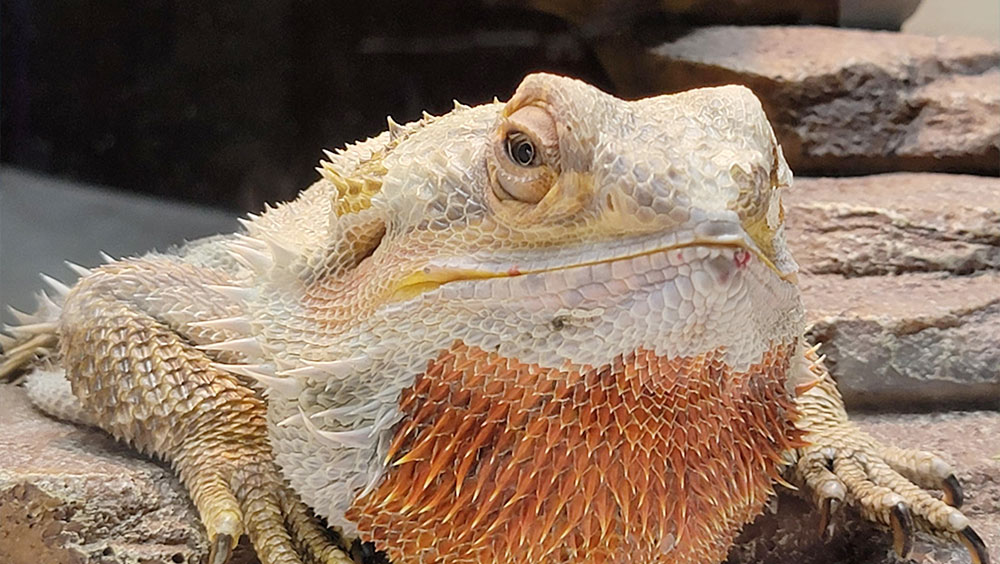Bearded dragons are popular reptiles among pet owners, due to their low-maintenance lifestyle and friendly demeanor. Despite their gentle nature, many people wonder if bearded dragons bite. While these lizards typically do not bite, there are specific scenarios where a bite may occur. This article will discuss the likelihood of a bearded dragon biting and how to handle such an occurrence.
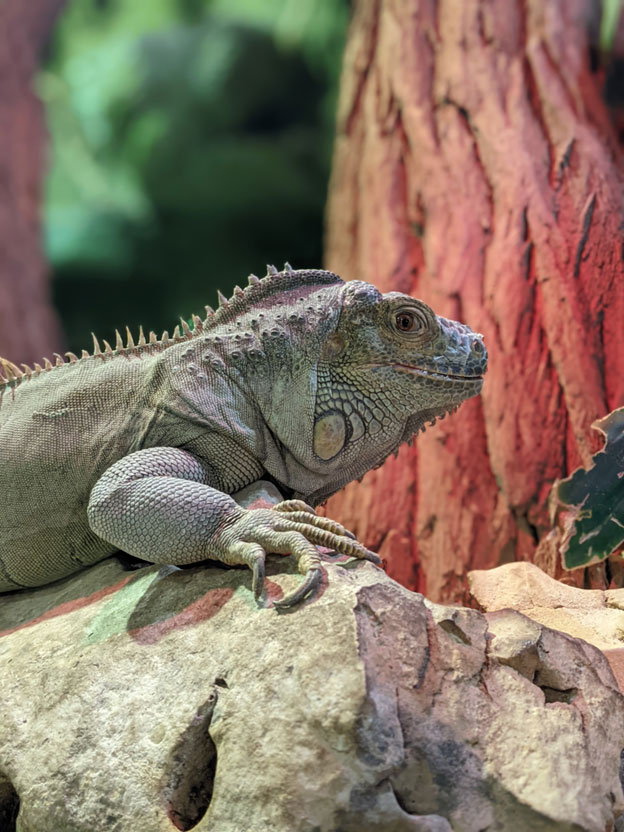
Understanding Bearded Dragon Behavior
Introduction to Bearded Dragons
Bearded dragons are popular pet reptiles known for their docile nature and unique appearance. These reptiles are native to the arid regions of Australia and have become increasingly popular among reptile enthusiasts.
Bearded dragons are named after the spiny projections under their throats that resemble a beard. They can grow up to 24 inches in length and are typically kept in glass tanks with proper heating and lighting.
One common concern that potential owners have is whether bearded dragons bite. While bearded dragons do have sharp teeth, they are generally gentle creatures and typically only bite when they feel threatened or stressed. It is important to handle them with care and to properly read their body language to ensure a stress-free environment.
It is worth noting that while bearded dragons do not have venom glands, they can sometimes have mild venomous properties in their bites. However, these bites are usually harmless and rarely cause any significant issues.
Normal Behavior
Bearded dragons are known for their docile nature and gentle temperament. They are generally calm reptiles that display friendly behavior towards their owners. When these creatures are well taken care of and provided with a stress-free environment, they are unlikely to exhibit aggressive behaviors.
Bearded dragons communicate their feelings and intentions through their body language. One common sign of stress or aggression is when they puff up their beard to display a black coloration, hence the name "bearded dragon." However, this behavior does not necessarily mean that they will bite. Instead, it serves as a warning sign to let others know that they are feeling threatened or uncomfortable.
It is crucial to give these pets time to adjust to their new surroundings and to handle them gently and with care. By doing so, the risk of bites can be significantly reduced. Providing a stress-free and enriching environment for your bearded dragon will encourage them to be more comfortable and relaxed, minimizing any potential biting incidents.
Why Do Pets Bite?
Pets may bite for a variety of reasons. While bearded dragons are generally docile and gentle creatures, there can be instances where they may bite. Understanding the underlying reasons for pet bites can help prevent such incidents.
One common reason for pet bites is fear or stress. Pets may feel threatened or uncomfortable in certain situations, leading them to bite as a defensive mechanism. Lack of proper socialization and handling can also contribute to fear-based aggression.
Another reason for pet bites is pain or discomfort. If a pet is injured, ill, or experiencing discomfort, they may bite as a way to protect themselves or communicate their distress. It is important to be aware of any signs of infection or injury that may be causing your pet discomfort.
Sometimes, pets may bite out of frustration or due to a lack of proper training. This can occur if their needs are not being met or if they are not receiving the appropriate mental and physical stimulation.
Rare Occurrences
While they are generally known for their docile and gentle nature, bearded dragons rarely bite humans. They have mild venom and sharp teeth, a reason bearded dragon bites hurt for a while.
Bearded dragons, when properly cared for and handled, are typically quite calm reptiles that rarely display aggressive behaviors. Their bodies are covered in small, sharp teeth, but their bites are usually more of a warning sign than a serious threat.
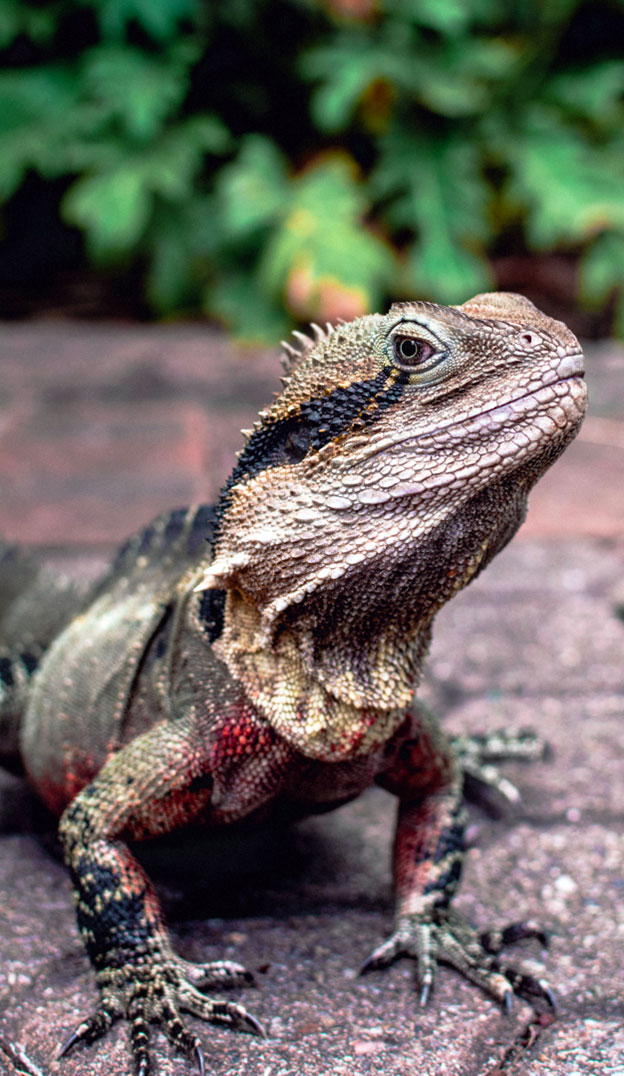
When a bearded dragon feels stressed or threatened, it may give a warning by puffing out its beard (hence the name), turning it black. This is a clear indication of their discomfort and should be respected by keeping a safe distance.
If you have been bitten by a bearded dragon, it's crucial to assess the situation and the severity of the bite. Bearded dragon bites can range from harmless, accidental nips to slightly painful bites that may break the skin.
In the case of a minor bite, wash the affected area with mild soap and warm water, then apply an antiseptic wipe or antibacterial ointment to prevent any potential risk of infection. However, if the bite is more severe or shows signs of infection, it's advisable to seek medical attention from a healthcare professional.
Remember, rare as they may be, it's still essential to handle bearded dragons with care, respect their personal space, and provide them with a stress-free environment to minimize the risk of bites.
Reasons for Biting
While bearded dragons are generally docile and gentle creatures, there are certain situations or circumstances that may lead them to bite. Understanding these reasons can help owners prevent or address biting behavior.
Stress or fear: Bearded dragons may bite when they feel threatened or stressed. Sudden movements, loud noises, or unfamiliar environments can trigger this response. Providing a stress-free environment and handling them with care can help minimize this behavior.
Mistaken identity: Sometimes, bearded dragons may mistake fingers or hands for food. Their keen senses and predatory instincts can lead them to bite unintentionally. Avoid hand feeding, especially if the dragon is not accustomed to it.
Territorial behavior: Bearded dragons, particularly males, can exhibit territorial aggression. Their biting may be a way to establish dominance or defend their territory. Proper husbandry and providing adequate space can help reduce such behavior.
Pain or discomfort: If a bearded dragon is experiencing pain or discomfort, it may bite as a defensive response. This could be due to an injury, illness, or improper handling. Regular health check-ups and ensuring their habitat meets their needs is essential.
Lack of socialization: Bearded dragons that have not been properly socialized may bite out of fear or lack of trust. Gradually introducing them to various stimuli and positive interactions can help minimize this behavior.
Reading Your Bearded Dragon's Signals
Bearded dragons have a unique way of communicating their emotions and intentions through their body language. By understanding the signs, you can better assess if your dragon is feeling threatened or stressed. Here are some key signals to look out for:
Black beard: When a bearded dragon's beard turns black, it usually indicates stress, aggression, or fear. This is a clear warning sign that they may bite if provoked or continue to feel threatened.
Hissing or puffing up: These defensive behaviors are another indication that your dragon is feeling anxious or threatened. They may hiss or puff themselves up to appear larger and more intimidating.
Tail twitching: A twitching tail is a sign of agitation or annoyance. It's important to observe the context and other signals to determine the level of stress your dragon may be experiencing.
Body flattening: When a bearded dragon flattens its body against a surface, it is trying to make itself appear larger and more dominant. This behavior is often seen during displays of territorial aggression.
Open-mouthed display: If your dragon opens its mouth slightly and displays its tongue, it may be a sign of stress or discomfort. It could also be a response to a threatening situation.
Understanding and interpreting your bearded dragon's signals can help you create a calm and stress-free environment for them. It's important to give them space and avoid any sudden movements or situations that may trigger a bite.
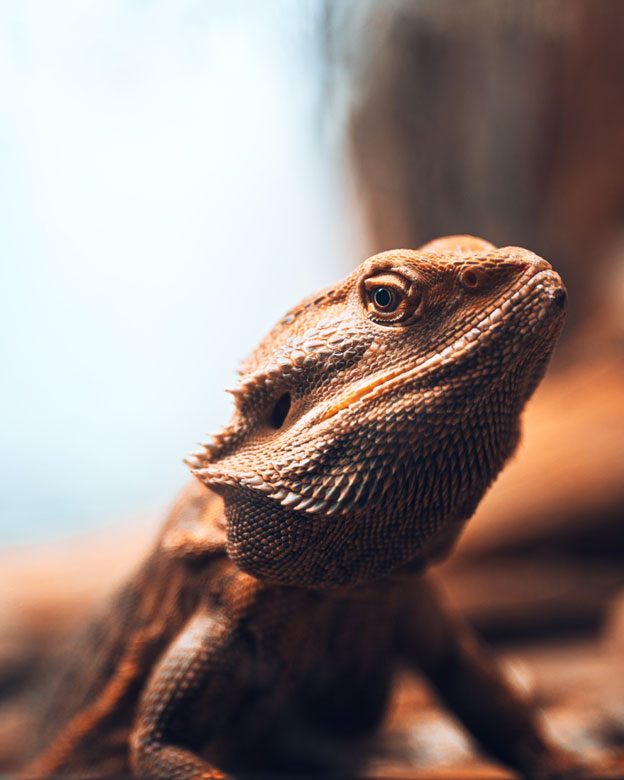
Handling Bearded Dragons
Approach with caution: Always approach your bearded dragon slowly and gently. Sudden movements can startle them and increase the risk of a defensive bite.
Give them time to warm up: Before handling your dragon, allow them some time to adjust to their surroundings and warm up. This will help them feel more comfortable and reduce the likelihood of aggression.
Be careful around their mouth: Avoid putting your fingers near their mouth, especially when they are eating or feeling threatened. Bearded dragons have sharp teeth and can accidentally mistake your fingers for food.
Watch for warning signs: Pay attention to their body language, including signs of stress such as a black beard or hissing. If you notice these signs, it's best to avoid handling them until they feel calmer.
Properly support their body: When picking up your dragon, ensure you support their entire body with both hands. This helps them feel secure and minimizes the risk of them trying to escape and potentially biting.
Stay hygienic: Wash your hands thoroughly with antibacterial soap before and after handling your bearded dragon. This reduces the risk of transmitting any bacteria, including the salmonella bacteria that they can potentially carry.
Conclusion
In conclusion, bearded dragons bite when they feel threatened or scared. It is important to handle them gently and respect their boundaries in order to avoid being bitten. Bearded dragons are generally gentle, curious creatures that make great pets for those willing to provide the proper environment and care for them. With proper handling and care, most owners should not have to worry about their bearded dragon biting them.
Frequently Asked Questions:
Are bearded dragon bites dangerous?
A bearded dragon bite can be painful and may break the skin, but it is not typically dangerous. Bearded dragons have small, sharp teeth that may cause minor scratches or puncture wounds. In most cases, these wounds heal quickly with little medical attention.
Can bearded dragons be trained not to bite?
Bearded dragons can be trained to not bite, but it is important to keep in mind that they are naturally curious and may still attempt to explore their environment with their mouth. The best way to teach a bearded dragon not to bite is through positive reinforcement, such as providing a treat or gentle petting when they display desired behaviors.
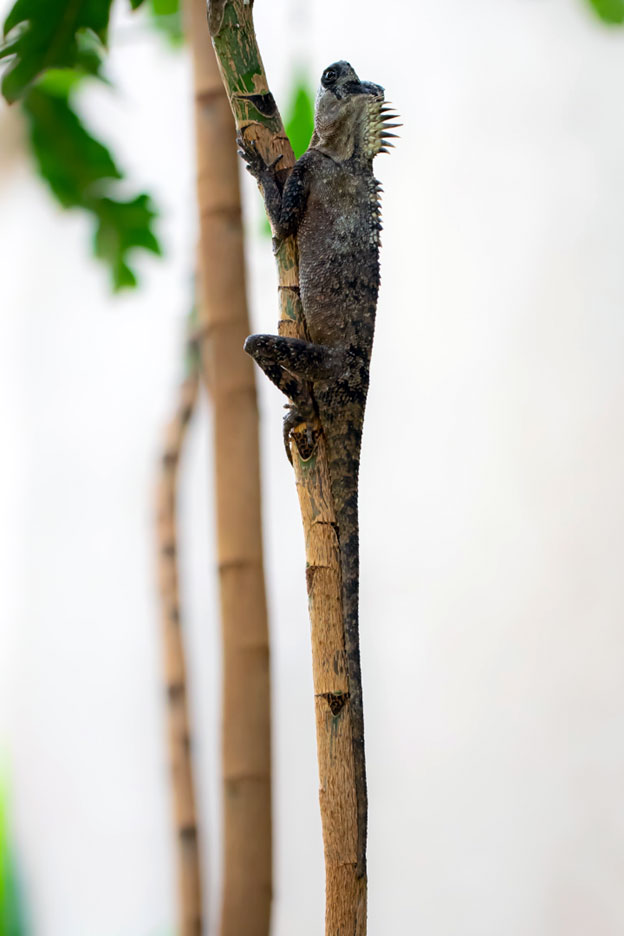
What should I do if my bearded dragon bites me?
If your bearded dragon bit you, it is important to remain calm and avoid any sudden movements. You should immediately remove your hand and gently place the dragon back in its enclosure. If the bite does break the skin, it is best to wash the area with soap and water and then apply a disinfectant or antibiotic ointment. It is also recommended that you contact your veterinarian for further advice.

